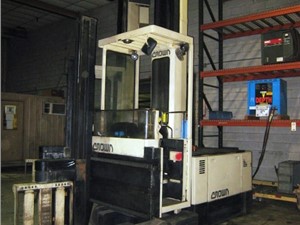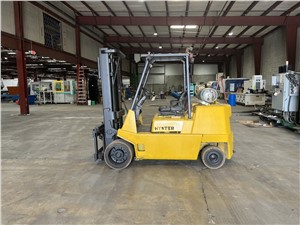Fork trucks, also known as forklifts, are essential pieces of equipment in many industries, including warehousing, construction, and manufacturing. These versatile vehicles are designed to lift, move, and transport heavy loads efficiently, making them indispensable tools in material handling. Fork trucks come in a variety of designs, each tailored to specific tasks and environments. Here are some of the most common types:
1. Counterbalance Forklifts
The most common type of fork truck, counterbalance forklifts, have forks protruding from the front and rely on a weight at the rear to balance the load. These are ideal for general warehouse use and outdoor applications.
2. Reach Forklifts
Reach forklifts are specifically designed for indoor use in tight spaces. They have an extended reach mechanism, allowing operators to access high shelves in narrow aisles.
3. Pallet Jacks
Pallet jacks are smaller and more rudimentary compared to larger forklifts. They are primarily used for lifting and moving pallets over short distances, making them perfect for light warehouse tasks.
4. Telescopic Handlers (Telehandlers)
These forklifts are highly versatile, equipped with a telescopic boom to lift heavy loads to great heights or over obstacles. They are commonly used in construction and agriculture.
5. Rough Terrain Forklifts
Built for outdoor environments, rough terrain forklifts feature heavy-duty tires and robust frames, allowing them to move over uneven surfaces with ease. They are frequently used in construction and logging industries.
Properly Appraising Fork Trucks
When purchasing, accurate appraisal is critical to ensure you get the best value for your investment. Below are key factors to consider:
Condition - Evaluate the overall condition of the fork truck, including the engine, hydraulics, tires, and mast. Signs of wear and tear or damage can indicate the need for costly repairs.
Hours of Operation - Like mileage on a car, the total hours of operation can give you an idea of how heavily the fork truck has been used. Lower hours typically indicate better reliability
Load Capacity - Ensure the fork truck meets the load requirements for your tasks. Overloading can lead to safety risks and damage over time.
Age and Model - Newer models often come with advanced features and improved efficiency. However, older models may still be a cost-effective choice if well-maintained.
Service History - A well-documented maintenance record demonstrates that the fork truck has been properly cared for, reducing the likelihood of unexpected repairs.
Attachments - Some forklifts come with specialized attachments, such as clamps, side shifters, or rotators. These can add versatility but may also increase the price.
Top Fork Truck Brands in the Industry
When it comes to fork trucks, several brands stand out for their exceptional performance, reliability, and innovative features. Here are some of the best brands in the business:
Toyota, Crown, Hyster, Yale, Mitsubishi, Komatsu, Jungheinrich, Clark
Selecting the right fork truck involves understanding your operational needs and thoroughly assessing the options available. With numerous types catering to different tasks and a wealth of high-quality brands in the market, investing in the right forklift can greatly enhance your efficiency and productivity. Whether you choose an industry leader like Toyota or a specialist like Crown, a well-maintained and suited fork truck is an invaluable asset to any business.

.jpg)
.jpg)
.jpg)

.jpg)
.JPG)
